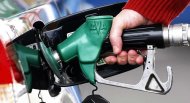- Joined
- Nov 29, 2008
- Messages
- 7,832
- Location
- In a World of My Own.
- Car
- 2017 Audi RS6 Avant Performance Edition. Range Rover Supercharged - Lovely!
Source. Press Association.

Petrol sales fell by 5 per cent in the first half of the year.
More motorists cut back on driving in the first half of the year as record fuel prices squeezed household incomes and triggered a 5% drop in petrol sales.
The slide in volumes between January and June, equal to 517.2 million litres, deprived the Treasury of £985 million in fuel duty, the AA motoring organisation said.
The decline sped up throughout the period, with sales dropping 6.6% in the second quarter compared with a 3.9% fall in the previous three months, as petrol hit a peak of 137.43p a litre and diesel touched 143.04p.
The study also revealed supermarkets have "coped" better with the downturn as petrol sales at non-supermarket retailers dropped 11.8%, while greater competition on price meant supermarkets saw a 0.4% increase.
Edmund King, president of the AA, said many car owners could not afford record forecourt prices and were "losing mobility as a consequence".
He said: "There is no downplaying the impact of record fuel prices on family and other people's lives."
The cost of petrol surged in the first half of the year as volatility in north Africa and the Middle East threatened oil supplies and forced up prices. However, global recession fears have seen the price of oil come off the boil, gradually dropping since its peak in May.
Brent crude in London has dropped below the 100 US dollar-a-barrel mark for the first time since August 9. But the AA previously said a dip in petrol prices had failed to match the fall in wholesale prices.
The AA said new government figures show 1.7 billion fewer litres of petrol and diesel were sold at UK petrol stations than in the first half of 2008, just as the country was plunging into recession.
Motorists paid on average 133.13p per litre of petrol between January and June this year, compared with 116.68p the previous year and 109p in 2008, the AA said.

Petrol sales fell by 5 per cent in the first half of the year.
More motorists cut back on driving in the first half of the year as record fuel prices squeezed household incomes and triggered a 5% drop in petrol sales.
The slide in volumes between January and June, equal to 517.2 million litres, deprived the Treasury of £985 million in fuel duty, the AA motoring organisation said.
The decline sped up throughout the period, with sales dropping 6.6% in the second quarter compared with a 3.9% fall in the previous three months, as petrol hit a peak of 137.43p a litre and diesel touched 143.04p.
The study also revealed supermarkets have "coped" better with the downturn as petrol sales at non-supermarket retailers dropped 11.8%, while greater competition on price meant supermarkets saw a 0.4% increase.
Edmund King, president of the AA, said many car owners could not afford record forecourt prices and were "losing mobility as a consequence".
He said: "There is no downplaying the impact of record fuel prices on family and other people's lives."
The cost of petrol surged in the first half of the year as volatility in north Africa and the Middle East threatened oil supplies and forced up prices. However, global recession fears have seen the price of oil come off the boil, gradually dropping since its peak in May.
Brent crude in London has dropped below the 100 US dollar-a-barrel mark for the first time since August 9. But the AA previously said a dip in petrol prices had failed to match the fall in wholesale prices.
The AA said new government figures show 1.7 billion fewer litres of petrol and diesel were sold at UK petrol stations than in the first half of 2008, just as the country was plunging into recession.
Motorists paid on average 133.13p per litre of petrol between January and June this year, compared with 116.68p the previous year and 109p in 2008, the AA said.

 £1.90/litre? or have I misread
£1.90/litre? or have I misread